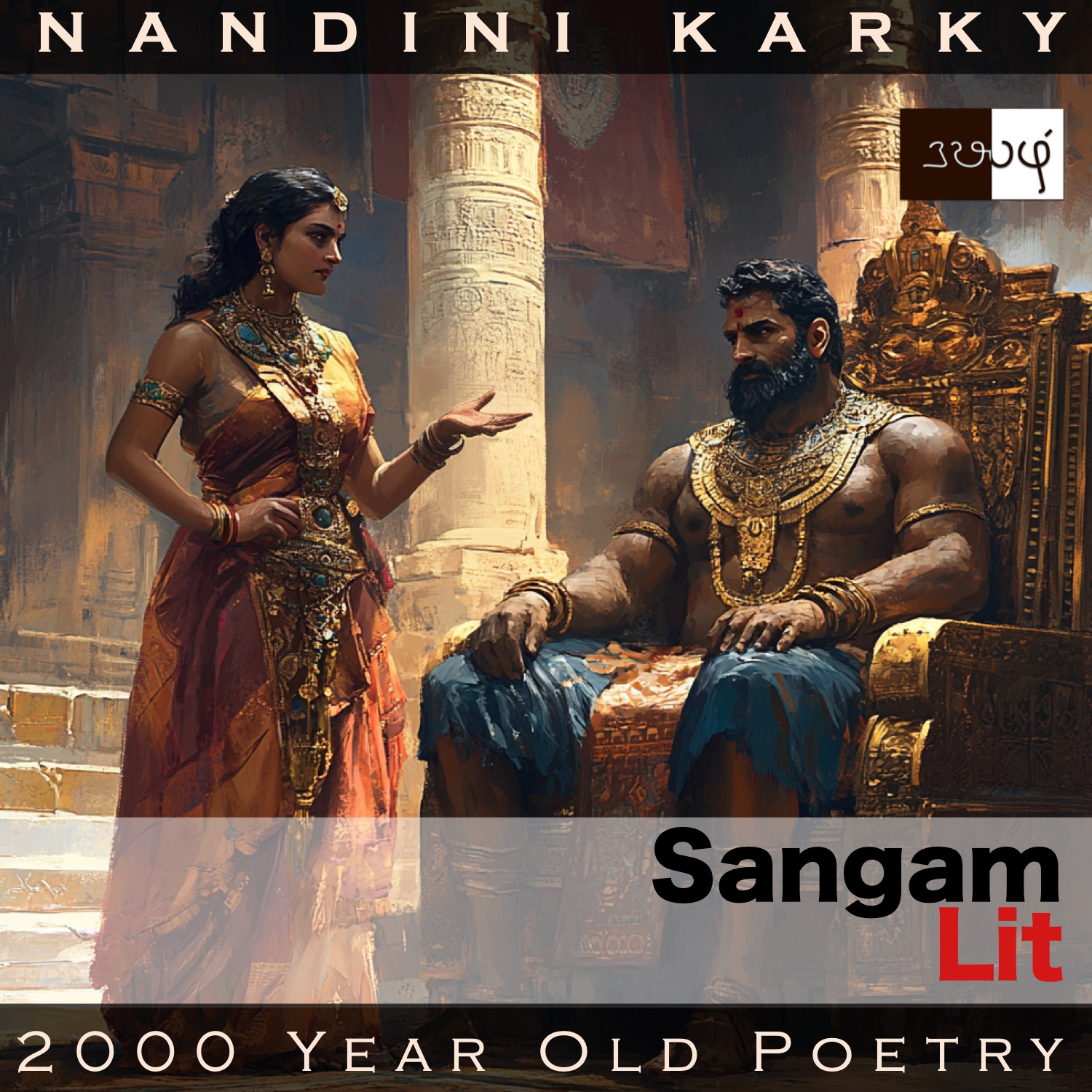Podcast: Play in new window | Download
Subscribe: Apple Podcasts | Spotify | Amazon Music | Android | iHeartRadio | TuneIn | RSS | More
In this episode, we perceive the intersection of different aspects of life, as portrayed in Sangam Literary work, Kalithogai 100, penned by Maruthan Ilanaakanaar. The verse is situated in the ‘Marutham’ or ‘Farmlands landscape’ and pleads for a king’s kindness.

ஈண்டு நீர்மிசைத் தோன்றி இருள் சீக்கும் சுடரே போல்,
வேண்டாதார் நெஞ்சு உட்க, வெரு வந்த கொடுமையும்,
நீண்டு தோன்று உயர் குடை நிழல் எனச் சேர்ந்தார்க்குக்
காண் தகு மதி என்னக் கதிர் விடு தண்மையும்,
மாண்ட நின் ஒழுக்கத்தான், மறு இன்றி, வியன் ஞாலத்து
யாண்டோரும் தொழுது ஏத்தும் இரங்கு இசை முரசினாய்!
‘ஐயம் தீர்ந்து யார்கண்ணும் அருந் தவ முதல்வன் போல்
பொய் கூறாய்’ என நின்னைப் புகழ்வது கெடாதோதான்
நல்கி நீ தெளித்த சொல் நசை எனத் தேறியாள்
பல் இதழ் மலர் உண்கண் பனி மல்கக் காணுங்கால்?
‘சுரந்த வான் பொழிந்தற்றா, சூழ நின்று யாவர்க்கும்
இரந்தது நசை வாட்டாய்’ என்பது கெடாதோதான்
கலங்கு அஞர் உற்று, நின் கமழ் மார்பு நசைஇயாள்
இலங்கு கோல் அவிர் தொடி இறை ஊரக் காணுங்கால்?
‘உறை வரை நிறுத்த கோல், உயிர் திறம் பெயர்ப்பான் போல்,
முறை செய்தி’ என நின்னை மொழிவது கெடாதோதான்
அழி படர் வருத்த, நின் அளி வேண்டிக் கலங்கியாள்
பழி தபு வாள் முகம் பசப்பு ஊரக் காணுங்கால்?
ஆங்கு
தொல் நலம் இழந்தோள், நீ துணை எனப் புணர்ந்தவள்
இன் உறல் வியன் மார்ப! ‘இனையையால்; கொடிது’ என,
நின்னை யான் கழறுதல் வேண்டுமோ,
என்னோர்கள் இடும்பையும் களைந்தீவாய் நினக்கே?
Another verse in the exact same sentiment of the previous one, making a plea to a king on behalf of a maiden! The words can be translated as follows:
“Akin to the flame that soars above the seas ending the darkness, you shower harshness to spread fear in the hearts of foes, and akin to the pleasant moon that renders its cool rays, you render compassion to those who come seeking the towering shade of your tall umbrella. Since you are one with such estimable qualities that are flawless, everyone in this wide world worship and praise you, O lord with resounding drums!
Won’t the praise rendered to you, ‘Without a doubt, akin to the First One, renowned for his penances, he would never lie to anyone’ become false when one sees the many-petaled-flower-like, kohl-streaked eyes of the lady, who trusted your words to be those of love and grace, fill with tears?
Won’t the words, ‘Akin to the shower from the skies, you render with generosity to all those who surround you seeking’ become false when one sees the radiant and rounded bangles on the lady, who filled with tormenting sorrow, desires your fragrant chest, slip away from the wrist?
Won’t the words said about you, ‘Akin to One, who renders death and the rightful end to everyone’s days of life, with an unswerving sceptre, you render the right justice’ become false when one sees the faultless, shining face of the lady, who tormented by deep suffering, wishes for your grace, become covered in pallor?
And so, the one who has lost her old beauty, the one whom you united with as your companion must attain your sweet embraces, O man with a wide chest! Should I even say ‘Such is the situation filled with cruelty’ and chide you, O lord, when you are one who has ended the distress of countless others?”
Let’s explore the nuances. The verse is situated in the context of a love that brims over and brings suffering. As in the case of the previous verse, these are words said to a king, referring to his domestic life, spoken by the lady’s confidante. The confidante starts by portraying the nature of the king’s rule, talking about how he can be the harsh sun, when it comes to inciting fear in his enemies and how he can be the cool moon, when showering with compassion to those who come seeking. She also mentions how everyone praises and worships the king. Then, she takes the three-step Kalithogai path to ask the king, won’t the words of praise about his truthfulness, generosity and justice become falsified when one takes in the tear-streaked eyes, slipping bangles, pallor-covered face of the lady, who suffers seeking the love and grace of the king.
Interesting to see the similes employed for each of the king’s qualities: For his truthfulness, a God called as the First One, whom some interpreters think refers to God Siva, is referred; For the king’s generosity, the much used simile of a rain shower that ends the thirst of a land is employed; and for justice, the most interesting simile of Death, which renders its judgement to all the people at the end of their days of life, without bias, has been used. Through this, we understand the perspective of Sangam people about death, seeing it as a deserved and righteous end to a person’s life.
Returning, the confidante, after appealing to the king’s honour in being true to his fame, talks about how it’s essential for the lady to attain the king’s grace and ends with a piercing question of whether there was any need for her to even talk and rebuke the king, the person who has destroyed the distress of many, many people in his land! Fascinating to see this confluence of the political and personal in the life of an ancient ruler, bringing together the realms of outer and inner life.
With this slice of life, we come to the end of verses in Kalithogai that are situated in the ‘Marutham’ or ‘Farmlands’ landscape. While most of the verses dealt with the in-house fighting between the man and the lady over the courtesan, there have been some intriguing exceptions like that portrait of love between a dwarf and a hunchback, and these final verses taking a holistic view of different dimensions in life. Even in the songs of the love quarrel, we have witnessed the spellbinding creativity in connecting disparate elements. Now, it’s time to say bye to the quarrelling couple, surrounded by the plenty of this landscape, and journey on to the next domain!




Share your thoughts...